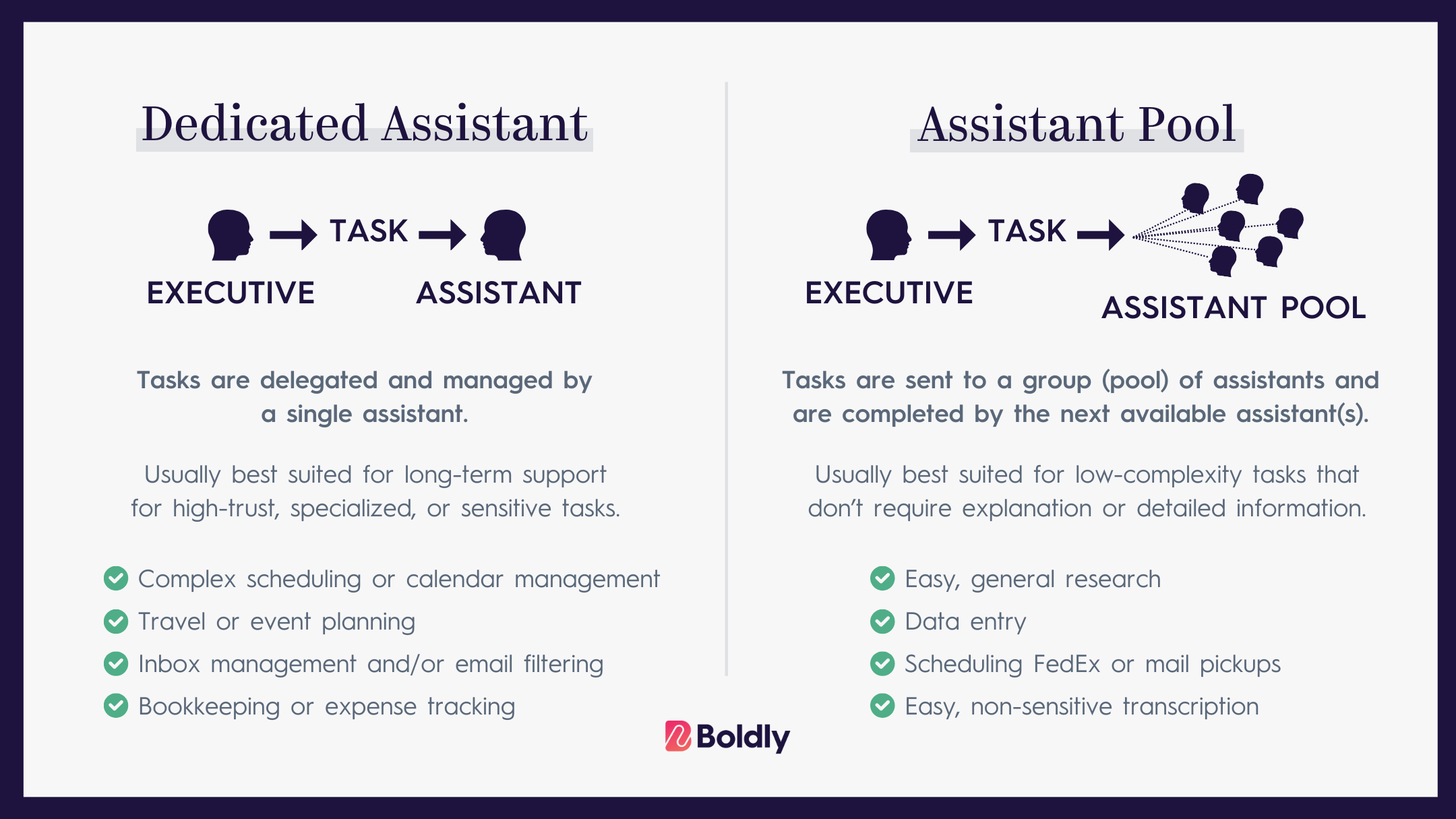With inflation on the rise, getting the best return on investment possible in every area of business matters.
As a senior exec, that includes how you use your time.
Clearing your plate of admin tasks with the help of an executive assistant is a lock for boosting ROI. You instantly increase productivity and add hours back into your day.
It’s not an overstatement that the right executive assistant can change your life.
But finding the right assistant is the challenge. A remote staffing service can make it easy, reducing risk and promising a quick start. There are two main types of assistant services to choose from—dedicated assistants and assistant pools—which leads to the big question: which solution is best for you?
Typically, the decision comes down to the kind of support you need and whether it should be highly personalized or task-based.


This article will help you make the right choice by answering 5 key questions:
- What is a dedicated assistant?
- What is an assistant pool solution?
- How to choose which one is right for you
- Which types of tasks are best suited for each model
- How to find the best assistant company to fit your needs
Let’s boldly define what a dedicated assistant and a pooled solution is, along with the pros and cons of each.
What Are Dedicated Executive Assistants?
Dedicated assistants aren’t the same as a traditional secretarial pool. They work one-on-one with you providing complete personal support.
While dedicated assistants could technically include traditional in-office hires or freelancers, they typically are a specific remote staffing model that matches one remote assistant directly to one client.
The word “dedicated” doesn’t have to mean full-time. A part-time assistant or fractional executive assistant is still considered a dedicated assistant.
If you choose to go with a dedicated assistant, be sure to read more on the compliance of using remote assistants long term.
The Pros Of Using A Dedicated Executive Assistant:
- Builds trust and continuity that can be more productive and effective
- Perfect for long-term support
- After they’ve been onboarded, they can pick up and run with most tasks
- Requires less oversight and management
- Best for tasks that require a personalized touch
The Cons Of Using A Dedicated Executive Assistant:
- Can be more expensive than a pooled solution (but still more cost-effective than hiring in-house)
- Depending on the staffing company, if an assistant quits or goes on vacation, you might not have a backup
- Usually overqualified for data entry, one-off tasks, or simple projects
With one-on-one support, the types of assistants vary — ranging from administrative assistants and executive assistants to more specialized support roles.
What Is A Pooled Solution For Remote Assistants?
A pooled solution, in contrast to a dedicated assistant, uses a group of assistants.
We often picture the image of a secretarial pool, though the way we define assistant today is a much larger role. But it is from that type of pool that clients are assigned someone to support specific tasks. This assignment is based on skills or availability.
Administrative assistant pooled solutions are typically less expensive and include access to a dashboard where you can post your tasks instead of sending them directly to an assistant. Once posted, your task can be picked up by any of the remote assistants on the platform.
The pros of using a pooled assistant solution:
- It’s usually cheaper
- Quick assistance
- Great for easy tasks like data entry
- Perfect for anything that might need 24/7 support (someone in the pool will always have you covered)
- You’re insulated from assistants changing jobs or leaving
The cons of using a pooled assistant solution:
- Quality can vary, especially on more complex tasks
- The assistant doing the work isn’t constant, so you won’t have someone taking the time to get to know your personal preferences
- You may have to spell out and submit every task (whereas a dedicated assistant will usually start to proactively manage things on their own)
- Not recommended for anything that might require sensitive information (bank accounts, social security numbers, etc.)
In general, using a pooled assistant may sometimes take you more time to explain what you need than just doing it yourself (more on this later).
How To Choose Between A Pooled And Dedicated Assistant Solution
The best way to choose between a dedicated assistant and an assistant pooled solution is to think about the type of support you need.
Asking just five simple questions will make it easy to decide:
- Are you working 14-hour days and decided you needed someone to take over your simple but necessary tasks?
- Did you want someone who can fully focus on running the backend of your business?
- Did you want an experienced professional to review and streamline your processes?
- Do you just want someone who can schedule a FedEx pickup for you?
- Do you have the time to explain exactly how you want something done, or would you prefer someone who can self-manage and pick up projects and run with them?
What you’re determining is the difference between a long-term asset (dedicated assistant) or just getting a little bit of low complexity, low-cost help (pooled solution).
When To Choose A Pooled Solution
If you’re looking for someone who can just take over simple tasks or provide some help now and then with short-term projects you may be fine using a pooled solution.
Handing over low-stakes tasks such as scheduling a FedEx pickup requires no deep insight into your business, nor does it call for extensive training from you. It doesn’t matter who handles the tasks.
Choosing a qualified candidate from a pool is a quick solution that will save you time and money.
When To Choose A Dedicated Assistant
If you’re looking for someone who can take on more high-trust, specialized, or sensitive tasks, you’ll want a fully dedicated assistant.
You need someone to manage your email inbox or schedule critical appointments with high-value clients. You need someone to book your travel, which requires knowing your travel preferences, traveler ID numbers, payment information, and more.
Because you’re providing access to important information, these are tasks that require genuine trust.
What Types Of Tasks Are Best Suited For Pooled Solutions?
Many executives underestimate the amount of personal detail that goes into each task they do. They’ve done it so long, it’s second nature. It doesn’t seem that it would take long at all.
That is, until they go to delegate those tasks. Suddenly it’s clear how much direction is needed for the task to be done right.
Here’s the biggest issue with pooled assistant solutions: Often, executives find that assigning the task and going over details takes more time than doing the task themself. When this is the case there is zero return on investment.
For example, let’s say you want your assistant to schedule a meeting. You might think this is as simple as “Schedule a meeting with John Todd.”
However, if you use an administrative assistant pooled solution, you’d also need to include the following information in your request:
- Which calendar system to use
- What format you prefer your meetings to be in and how to label the invite
- Any logins to Zoom, Google Calendar, or other relevant accounts
- Share John Todd’s email address so the assistant can reach out and check his availability
- If it’s an in-person meeting, where you’d like to meet him, and the address
- Etc.
With a pooled solution, every time you submit a request to schedule a meeting this information has to go along with it. Someone you’ve never worked with before could take on the task. It’s easy to see how simple tasks are just easier (and more efficient) to do yourself.
Of course, there are tasks that do not require this level of detail.
Tasks Well-Suited To A Pooled Remote Assistant Solution
Not all tasks require extreme detail to complete. Here are five simple tasks that will work for pooled solutions:
- I’m looking for an item that I can’t find locally. Can you find me a place that will ship me this item?
- Can you make me a reservation at a fancy steakhouse near my zip code for 4 people on this date and time?
- Can you send flowers/a gift in this price range to the following address to arrive before a certain date?
- Can you research hotels in this area code that have conference rooms large enough for 10 people and the cost to rent each for a week?
- Can you try to find a store around my zip code that has the new Apple Watch in stock and then call to hold it for me?
When choosing a pooled solution, it’s important to have tasks lined up where little to no internal information has to be shared. Information that can be accessed by the general public takes the least amount of explanation. That means actual time saved for you.
What Types Of Tasks Are Best Suited For Dedicated Assistants?
Pooled solutions and AI tools will fail to meet many senior executive’s needs, even if they save time now and then.
Dedicated assistants do more than just complete high-level tasks. They become strategic partners that can keep everything running behind the scenes so you can narrow your focus to business initiatives and the work only you can do.
Tasks well-suited to a dedicated assistant:
- Complex scheduling
- Travel or event planning
- Inbox management and/or email filtering
- Bookkeeping
- Monthly expense tracking
- Complex research
- Fielding calls
- Setting appointments
- Managing contracts
- Etc…
These are complicated tasks, not appropriate for randomly assigned assistants from a pool.
If you’re sure that a dedicated assistant is what you need, consider the experience level you should aim for. While several companies are offering highly experienced remote executive assistants, you’ll want to make sure that they can provide a long-term solution.
This is where subscription staffing shines.
This model provides support, benefits, and W2 employment to its team, and it has one of the highest retention rates in the industry. That’s peace of mind, knowing your dedicated assistant will stick around for years instead of jumping to the next gig.
Starting Your Search For A Remote Assistant
There are a few great places to begin your search for either a pooled or dedicated assistant.
If you want in-depth reviews of nearly every assistant company out there, one of our favorite sites is virtualassistantassistant.com.
Another good place to research remote assistant solutions is Glassdoor. If you want quality work, you need to choose a company that’s getting the job done. Glassdoor provides ratings and reviews of assistant solutions companies. You’ll be able to see if their clients liked the assistant solution and if their assistants are satisfied, both of which are equally important.
Next, check out the solutions website and see who their other clients are. Here are six things to look for:
- Are their businesses similar to yours?
- Is the site professional?
- Is the company onshore or offshore and does that matter to you?
- If you’re looking for a dedicated assistant, what is their team’s retention rate?
- What are the service plans like and is there one to fit your needs and budget?
- Do they offer a guarantee and what is their refund policy?
This phase of research will help to protect you from unforeseen issues. Though it takes time, it is an essential step before submitting a task or meeting with a representative from any solution in order to protect your valuable time.
The Final Decision: Dedicated Assistants vs. Pooled Solutions
So which type of assistant is right for you?
Choose a Pooled Solution:
If your needs align more with a secretarial pool concept, where your tasks are light and don’t require explanation or detailed information.
Choose a Dedicated Assistant:
If you’re looking for someone who can take on more high-trust, specialized, or sensitive tasks, you’ll want a fully dedicated assistant.
Remember, your choice isn’t written in stone. If you try one and it doesn’t work out, pivot to the other. Either way, an amazing remote executive assistant is one of the best decisions modern leaders can make.




